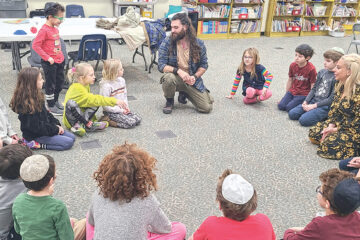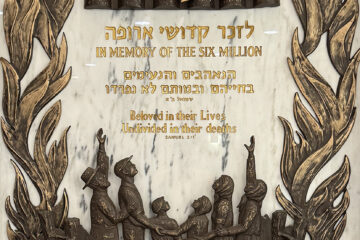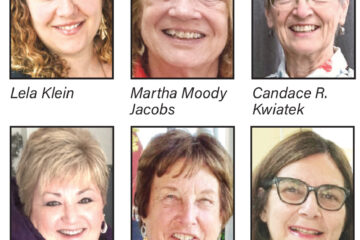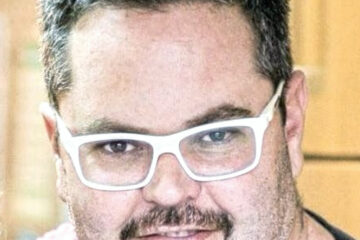Journeys to Judaism
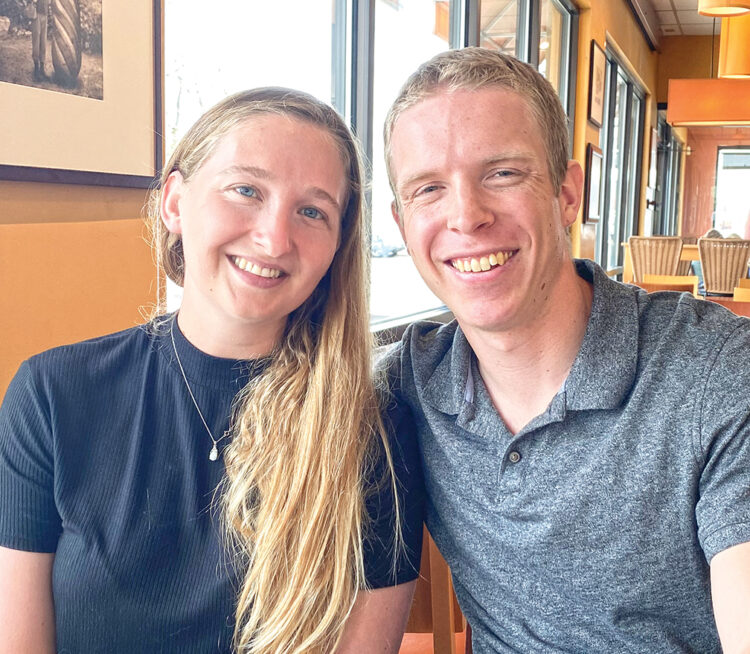
Since the Covid pandemic has receded, some area congregations have seen an uptick in conversions.
By Marshall Weiss, The Dayton Jewish Observer
Israeli American Ofir Ravin, 27, beams from the front row of Beth Abraham Synagogue’s main sanctuary as her husband, Ryan Lechich, 25, is called for an aliyah to the Torah for the first time.
On this Shabbat morning, June 17, Ryan carefully intones the blessings before and after the Torah reading. He then receives several blessings from Rabbi Aubrey Glazer, who prepared Ryan for his conversion.
Earlier that week, Ryan had met with a bet din (court of Jewish law) comprising three rabbis, and then immersed in the Miami Valley Mikvah. He is now a Jew.
Ryan is one of dozens of people in the Miami Valley who have recently converted to Judaism or are studying toward conversion. Rabbis at three area congregations say they’ve noticed an increase in conversion students and conversions to Judaism since the Covid pandemic has receded.
“It’s a large influx of people — and younger people — which I find to be really fascinating,” says Temple Israel Senior Rabbi Karen Bodney-Halasz. “I don’t know if any of them would say it has to do with Covid. It’s hard for me not to think that Covid gave them more time to think in trying to decide what is meaningful, with everyone realigning what’s important to them. There’s been a lot of reflection.”
She says more than 40 people are on Temple Israel’s roster of those asking about conversion, going through conversion, or who have converted over the last five or six years.
“Of the 40 I have, 13 have completed conversion,” Bodney-Halasz says. She estimates that over the coming year, eight to 10 more conversion students will complete the process. Before Covid hit, Temple Israel would facilitate four or five conversions a year.
Temple Israel Rabbi/Educator Tina Sobo adds that because some whole families have gone through the conversion process, she had three children join her third-to-fifth-grade religious school class after the High Holidays last fall.
“I’ve never had that happen before,” Sobo says.
Temple Beth Or Senior Rabbi Judy Chessin says she has “lots of conversions on the docket.”
She agrees with Bodney-Halasz that she hasn’t heard anyone say it’s because of Covid, but “in a post-lockdown society, people are searching for meaning, rootedness, and healing.”
“There’s always been a group of people en route” to conversion, Chessin says.
“I got a lot of calls in the last year or two. There seems to be an increase. I have a group, I call them ABD, All But Dipped. These are people who have been around for a while, and that’s my biggest group: people who were saying, OK, now is the time.”
Chessin’s group comprises women from their early 20s through their 40s. Each, she says, would like to hold her formal conversion at the mikvah on a Rosh Chodesh, the start of a Jewish month. Her group meets as a collective.
“I think they need community, and they need bravery,” Chessin says. “They need someone to go into cold places with. And so this was the first time I ever put a group together, and they really seem to like it, that they have each other.”
Those in the conversion process or who have recently converted to Judaism at Temple Beth Or preferred not to be interviewed by The Observer.
“There’s kind of an insecurity too,” Chessin says. “Am I valid? Should I be talking about it, or should I just find my place quietly for the moment?”
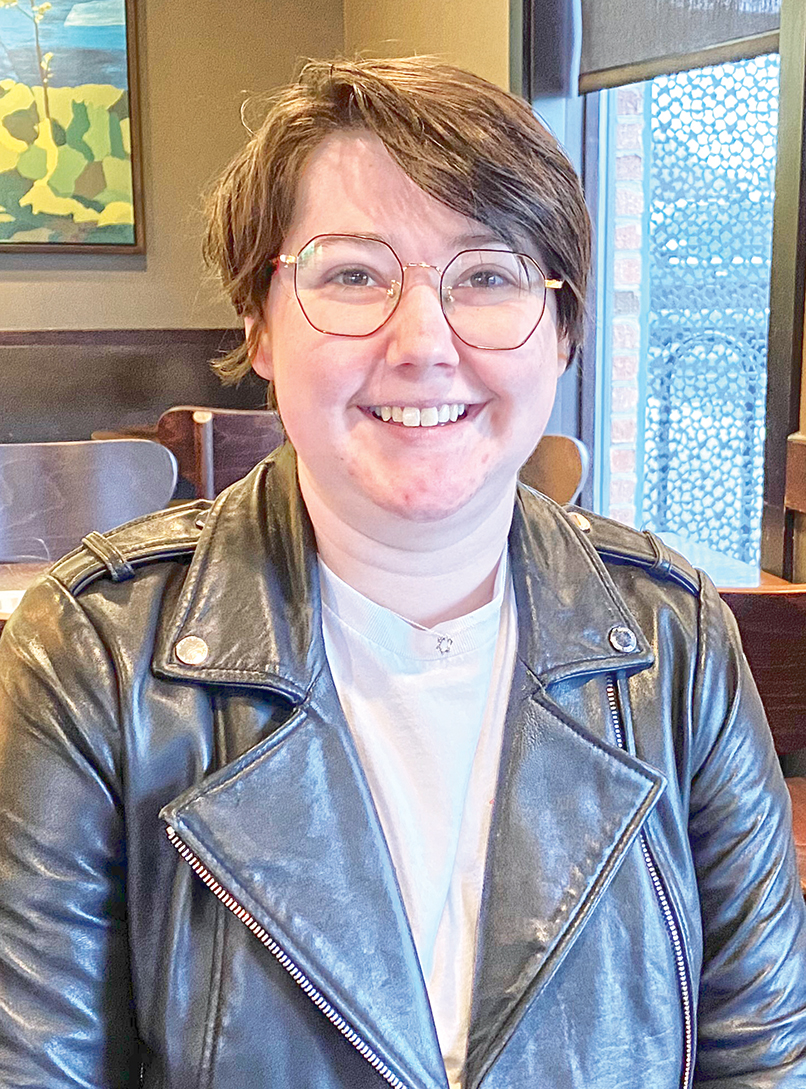
‘Tickling in the back of my brain’
Kit Brewer, 23, of Germantown, received their bachelor’s degree in individualized studies from Miami University in January. Their thesis was on gender, learning theory, and visual media. Kit has worked as a substitute teacher for Valley View Local Schools and has taught religious school at Temple Israel.
“I didn’t ever really meet Jewish people until I went to college,” Kit says. “But as I got there and I was meeting Jewish people, it started tickling in the back of my brain.”
The household Kit grew up in was not religious. Prior to Judaism, Kit was a practicing pagan for about a decade.
By Kit’s last semester in college last August, they called Temple Israel.
“I asked, ‘I’m not Jewish. Am I able to come in and attend a service?’ And they said, ‘Absolutely.’ So that next Friday, I walk in and immediately get adopted by a bunch that have been going for 30-plus years. And I’ve been there pretty much every week since.”
Bodney-Halasz guided Kit through the conversion process.
“She knew exactly how to hook me,” Kit says. “The first book she gave me was a big collection of essays about Jewish perspectives on sexuality and sex. I didn’t feel that I had to change anything about myself to approach Reform Judaism.”
In February, after about nine months of study, Kit emerged from the mikvah as a Jew.
“I’m a bit of an overachiever. It was a bit on a fast track. I was reading a lot. Just tearing through stuff. She would send me home with a stack of books and I’d be done with it in a couple of weeks.”
Kit is now considering entering the rabbinate.
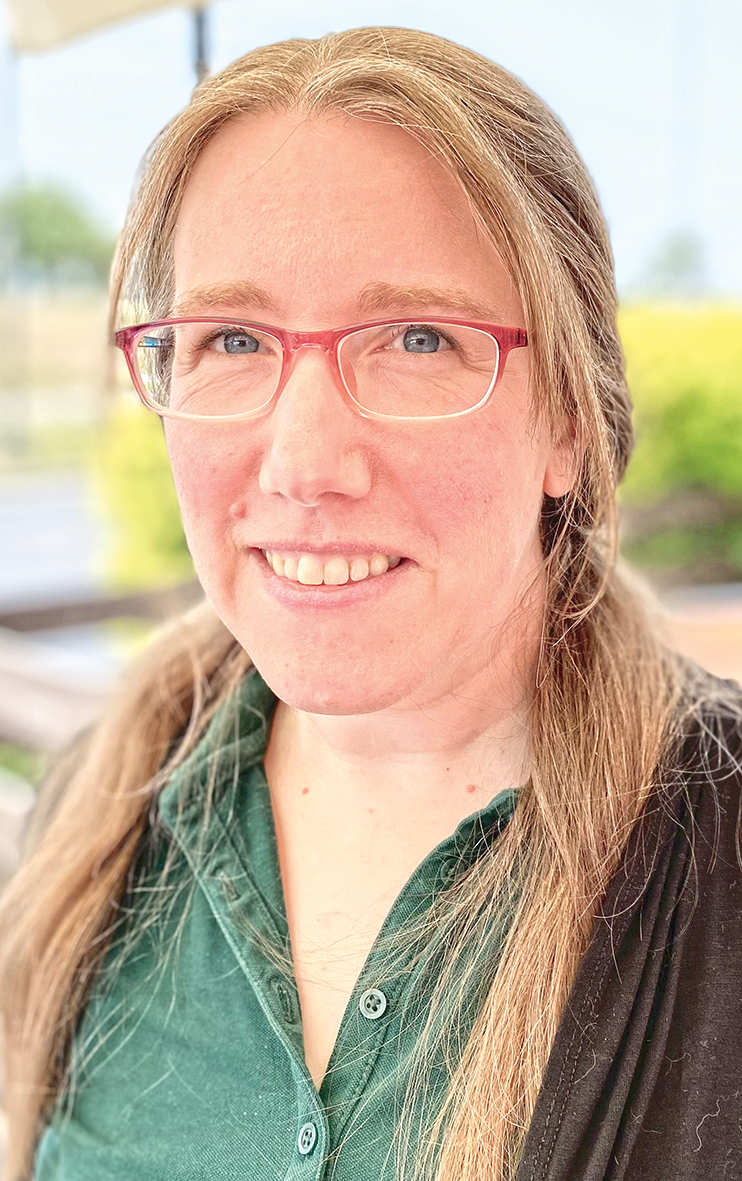
Perspectives and discussions
Angela Montjar, 44, says it was the darkness of trauma that drew her to Judaism on her journey of more than two decades.
“I’ve been through not nice things in my life,” the Springfield resident says. She was also drawn to understand how the horror of the Holocaust could happen and was curious about mysticism surrounding death and resurgence.
“I had a nervous breakdown when I was about 19 — and after that, things never really jelled for me,” Angela says. “So anytime that I was feeling particularly hurtful or didn’t know what was going on, it was not Christian God, it was Jewish God. I needed Jewish God because it meant more to me. And it was more comfortable to me.”
Around that time, she had a Jewish boyfriend. She learned a lot from him, she says, particularly about Kabalah.
After reading Daniel Mendelsohn’s The Lost: A Search for Six of Six Million last year, Angela decided to start researching Judaism again.
She appreciated how inclusive the language was at Temple Sholom’s website and contacted Rabbi Cary Kozberg.
Angela decided to visit the Springfield congregation on Purim in 2022, “because it’s such a happy kind of holiday.”
Once she spoke to the rabbi, she started coming regularly. She now studies with him toward her conversion.
“One of the things I like so much about Judaism is that you have all these different perspectives and then you talk about them. We have discussions about the parsha (Torah portion), what we read, what we’re singing, we’re talking about prayers.”
Angela notices that some Jews she encounters are uncomfortable talking about God. She and Kozberg have talked about this.
“The center of why God is not discussed, I think, is because God is so personal,” she says. “It’s a personal definition existing within us, and we don’t want to try and force that on anybody else.”
She’s also asked the rabbi about Judaism’s perspectives on mental health.
“That was kind of important to me. He essentially said you can’t just deny science.”
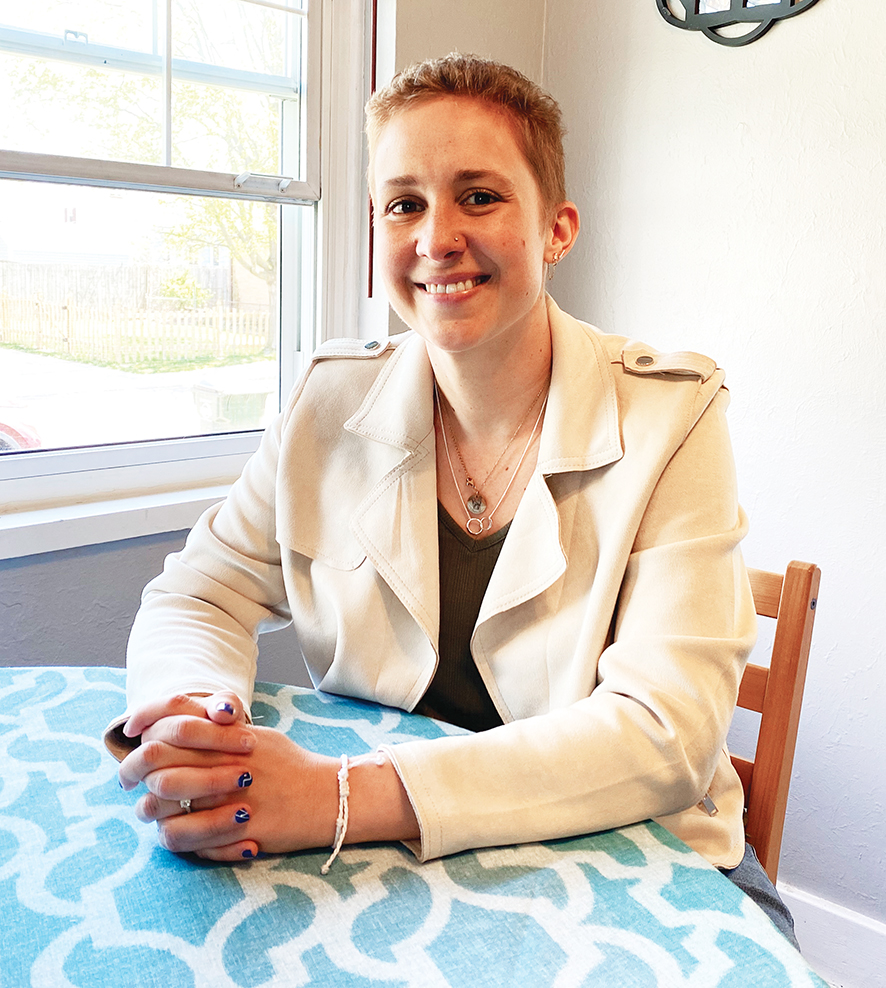
‘The more I learned, the more I couldn’t stop’
Mariah Strickland, 32, of Kettering, says she was always interested in Jewish religion and culture.
“I read book after book, listened to Jewish cultural music, visited historically important Jewish places, and tried to consume as much Jewish culture as I could,” she notes.
What stopped her from becoming Jewish earlier in her life? She didn’t know that a person could convert to Judaism.
Mariah says she was intimidated, too.
“Once I realized that conversion was possible, I started to learn more about that path for myself.”
Her current journey began in 2009, when she was diagnosed with stage 4 uterine leiomyosarcoma.
“I’ve definitely always been someone who had a strong belief in God but didn’t really find a particular religion or niche that I felt encapsulated everything I felt. I was looking into, if God is good, why is there evil? Why do people suffer? What happens after we pass?”
Mariah’s best friend from middle and high school — who converted when she married a Conservative Jew — suggested she consider Judaism.
“I hear from a lot of converts that there’s just this moment of alignment or feeling of coming home or clicking into place,” Mariah says. “And it definitely felt that way.”
Last fall, she signed up for the Introduction to Judaism course, offered each year by the Synagogue Forum of Greater Dayton.
“And the more I learned, the more I couldn’t stop. I started going to Temple Israel. I’ve been craving to be around people that have this idea of, there’s more than just the day-to-day in our lives, and that we’re all going in the same place, holding very similar beliefs. And that’s been really comforting in kind of answering or at least being able to sit with the unknowns.”
Mariah studies for her conversion with Bodney-Halasz. “It would be best if we took the whole year at least to kind of go through the whole cycle of holidays. But with my situation, it would kind of depend on how things go. I will definitely look to convert before my health gets too bad. Because if I get to a point where I can’t walk, or if I’m hospital-bound, I don’t think having my mikvah is going to be very possible at that time.
“But I’m still in the process of learning, so much that I don’t feel like I’m ready anytime soon. I’m trying to absorb as much as I can.”
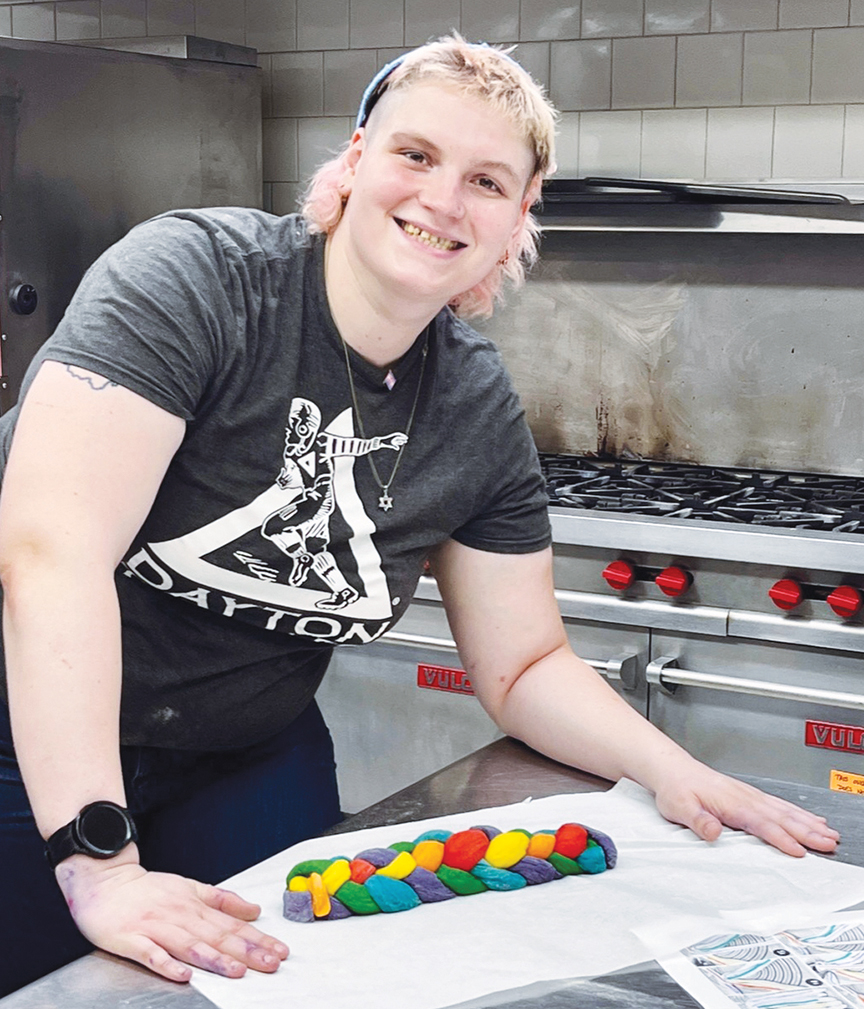
‘I just felt like I was at home’
Alexandria King, 26, grew up in Trotwood. She is a direct support professional in a group home, assisting individuals with developmental disabilities.
“I’ve been working at the same house for almost seven years now, and I’ve been helping the same four guys,” Alexandria says.
“Growing up, I was raised as a Christian. My mom was more religious than my dad. I’d probably describe my dad as agnostic. He’s one of the people who just tries to be a good person,” she says.
“I went to a lot of churches growing up, but that changed when my mom passed away back in 2006 when I was 9 years old.”
A year before Alexandria was born, her parents lost a child, a daughter, before the child’s first birthday.
It fell to Alexandria’s father to raise the four remaining children himself.
“I’m sure it was a big struggle for him. I can only imagine. He doesn’t reach out a lot. He’s my role model.”
Alexandria says she struggled with her religion for years ever since her mom died.
“How can there be a God if something like this happens? How would a loving God let something like this happen? It’s a struggle with, if God would let something like this happen, why should I worship him?”
For a while, she was an atheist. What pushed her toward Judaism, Alexandria says, was the time she spent on TikTok.
“The algorithm had, for some reason, pushed me toward a lot of Jewish creators. They would talk about their religion and aspects of the religion. And I thought, that makes sense.”
Alexandria made an appointment with Temple Israel’s Rabbi Karen Bodney-Halasz earlier this year.
“Specifically on their website it says we are open to the LGBT community. That meant a lot to me. Because being in the LGBT community, you become a bit wary of even a lot of the more so-called accepting religious institutions. You get that ‘love the sinner, hate the sin’ mentality.”
Alexandria had come out first as bisexual and then as transgender in high school.
“I went to Rabbi Karen and she was just super welcoming. She seemed very excited to work with me. When people want to put that effort in for you, you have to put the same effort in, if not more.”
The next week, she attended her first temple service. “I just felt like I was at home. That’s the best way I can describe it. During the kiddush, I just felt this burst of energy in me. And everything just felt right. And I felt at home. Like I was where I belonged. And every time since that I’ve been in temple, I’ve just felt the same feeling of belonging, of being home.”
She notes a shared history of trauma in the LGBTQ and Jewish communities.
“The Nazis killed queer men alongside Jewish men. The LGBTQ community went through the AIDS crisis. A lot of people in the LGBTQ community have been Jewish, like Harvey Milk. That was another reason why I was drawn into the Jewish community: because I was very aware of the overlap. And I felt that joining a community that had overlap — and having my voice in there — would help make both of our voices stronger.”
Alexandria is now in the process with Bodney-Halasz of learning to live as a Jew, “trying to integrate myself into the culture, doing what feels right for me.”
Newish to Jewish
The first holiday service Alexandria attended was Purim. For her first Passover experience, she participated in Temple Israel’s Newish To Jewish hands-on learning program.
Bodney-Halasz and longtime congregant Tom Bainbridge — who converted to Judaism years ago — came up with Newish to Jewish last summer as a post-conversion program. Tom is its chair.
“We did our first program in November, a Chanukah program,” Tom says. “Chanukah, in general, can be a difficult time if you’re in a family with a mixed religion. Trying to celebrate Chanukah when Christmas is so pervasive in our culture, it can be overwhelming. We wanted to help support people for that time of year.”
Participants also learned how to make latkes. Along with the discussions at the Passover program, they made charoset for the Seder plate.
“We also include some mentors at the programs, some longstanding members — some of them Jews by choice — to answer questions and help in the discussion part of it.”
Newish to Jewish is open to the entire community. The next program will be held in conjunction with the fast day of Tisha B’Av, at 7 p.m., Thursday, July 27.
Co-chairing Newish to Jewish is Nick Schmall, who converted through Temple Israel in August 2021. He’s a physics professor at Clark State College in Springfield.
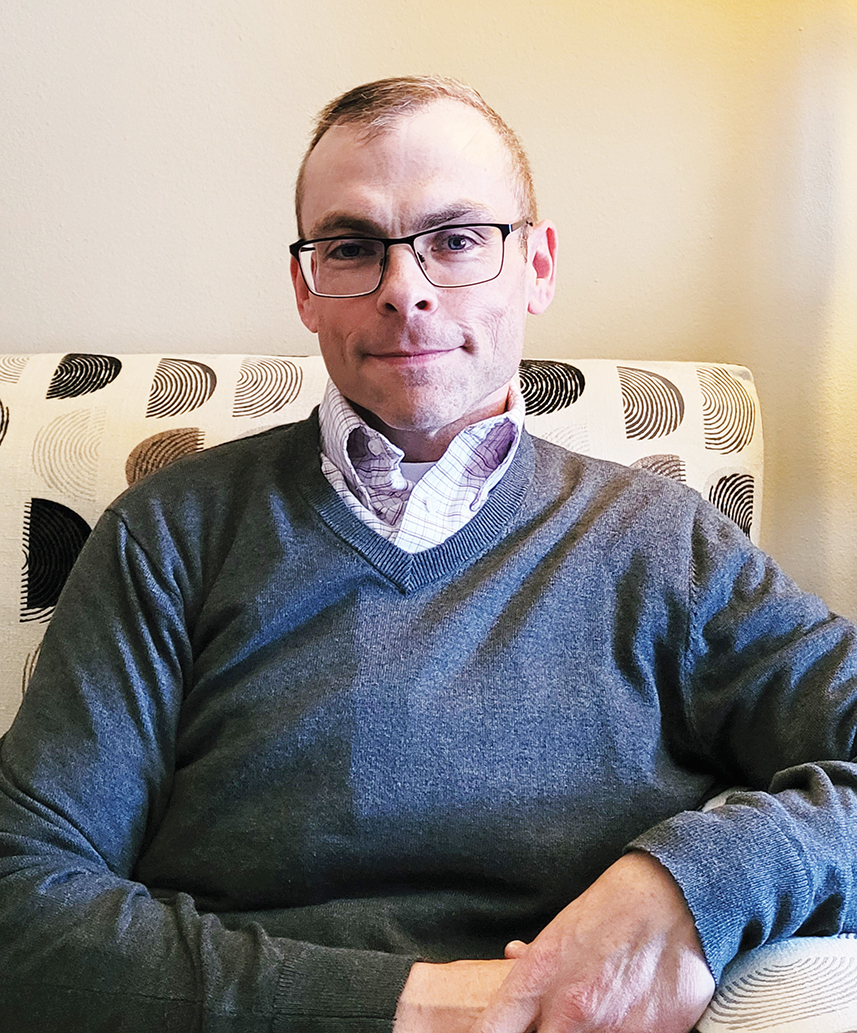
Forming a relationship with God
“I grew up in a really religious household,” Nick, 46, says. “Both my parents were Catholic, but my mom was primarily the inspiration. I always enjoyed being religious when I was young. It was always a central part of my life.”
He says atheism played a significant part in shaping his life and the “religious ideals” that led him to Judaism. He began exploring Judaism a year after college, in 2001 in Toledo. He bounced back and forth between Judaism and Catholicism and then was an atheist from his late 20s through his mid 30s.
“Even though I had renounced God, I still thought a lot about religion,” he says. He continued reading about religion and attended Jewish and Catholic worship services.
“I attended them because they had a meditative quality, something I needed after my father died in 2013,” he says. “During that time, I came to realize that I had a very narrow idea of God.” He came to appreciate what he describes as the “life affirming, positive idea that Judaism has of God.”
He decided to convert to Judaism in 2018, but hesitated. “I was worried about antisemitism increasing around that time, especially with the Pittsburgh synagogue shooting and the fact that the FBI stopped a potential shooting at Temple Shomer Emunim in late 2018.” Shomer Emunim is the temple in Toledo where Nick would attend services.
“Ultimately, I had to make the decision that if I had an affinity for the Jewish people and their faith, that I couldn’t let fear dictate my life decisions.”
Nick formally entered the conversion process in fall 2019 at Temple Shomer Emunim while still living in Toledo. He had to put it on hold when Covid hit.
“That was kind of a kick in the teeth,” Nick says. “I had to wait 20 years and then to wait even more. And then when we moved, I started the conversion process pretty much all over again with Rabbi Karen down here. It’s a religion that centers on my relationship with God. I enjoy the intimacy of that relationship to God, that the responsibility of forming a relationship with God is with me and only me.”
He adds that reading Maimonides was especially eye-opening. “God is somewhat mysterious. You have to wrestle with the idea of God. That’s what Israel means. It embraces uncertainty, which is what I like. There’s no definite reality of God. You have to essentially come to terms with that and figure it out.”
Nick says his wife, an agnostic, is incredibly supportive. “We’ve chit chatted about religion, but a conversion was not for her.”
Reactions of family and friends
Mariah Strickland says her husband is also supportive of her journey, “but it’s not something that he particularly feels the need to parse out for himself yet.”
She says her parents, who live in New York state, are supportive but not entirely understanding.
“I think I didn’t fully appreciate how Christian-leaning most of the world is. And even though I haven’t necessarily walked that path for many years, I think there’s a difference between ‘we just don’t talk about it,’ versus ‘I am actively choosing another path that I believe very strongly in.’ They ask a lot of good questions.”
Her in-laws, Mariah says, struggle more to understand why she chose to become a Jew. They live here in Ohio. They’re of the mind-set that one who does not accept Jesus as their savior will burn eternally in Hell, Mariah says. By that measure, they’re concerned for their son, too. And they’ve said all of this to Mariah directly. Her husband, she says, has her back.
“Even though he hasn’t found exactly what he believes, he believes that people should be able to choose what is right for them,” Mariah says. “And there’s been a big adjustment in terms of seeing my sense of purpose and my sense of happiness and enjoyment of life. And so, he supports me very much with his family.
“We’ve been together for over 10 years now. I think it’s to the point where I’m enough in the family where I can advocate for myself. And I also feel like that’s an important part of learning to become Jewish: it seems very un-Jewish to hide your Jewishness.”
When Alexandria King told her father she was converting to Judaism, she says, he was more surprised than anything else, “just because I had spent so much time being someone without faith.”
“A lot of people don’t notice the differences between Christian culture and Jewish culture until they’ve experienced both. One of the ideas that I had to break away from — even when I was identifying as atheist or agnostic — was the idea that you have to proselytize. And it’s a problem with a lot of atheist circles. Because they grew up as Christians, they are so used to proselytizing and trying to ‘convert.'”
Judaism is not a proselytizing belief system; Jews don’t seek others to become Jewish.
“It’s something I had to break away from because for me, my religion is very personal. And I had to get to that space before I could even move forward with any religion.”
Alexandria shares that her fiancé, who is also transgender, is now considering becoming a Jew.
“If he doesn’t want to go on the same path I’m on, that’s perfectly fine, because if we’re both happy and we’re both spiritually contented, that’s all that matters,” she said.
Angela Montjar says her dad, who lives in Arizona, is very supportive of her conversion process. “He’s said some very nice things that I never thought my dad would ever say to me. So it was kind of a way for us to get emotionally closer.”
Her mother lives in St. Paris. “My mom finally came to a service,” Angela says. “She came for Shavuot because I made blintzes. I was like, ‘You have to come. I slaved over these blintzes.’ But mostly her concerns were safety. We lock the doors. We have guards. But now that she’s actually been to a service, I think she understands a little bit more.
“And she keeps saying, ‘Everyone was so nice to me.’ She wasn’t sure what to expect. My mom was raised Lutheran. I was raised Lutheran. My dad was Catholic. My dad is now Episcopalian. She doesn’t have different ideas of God. I think it’s strange to her to see that there are so many similarities. More than she probably thought there would be.”
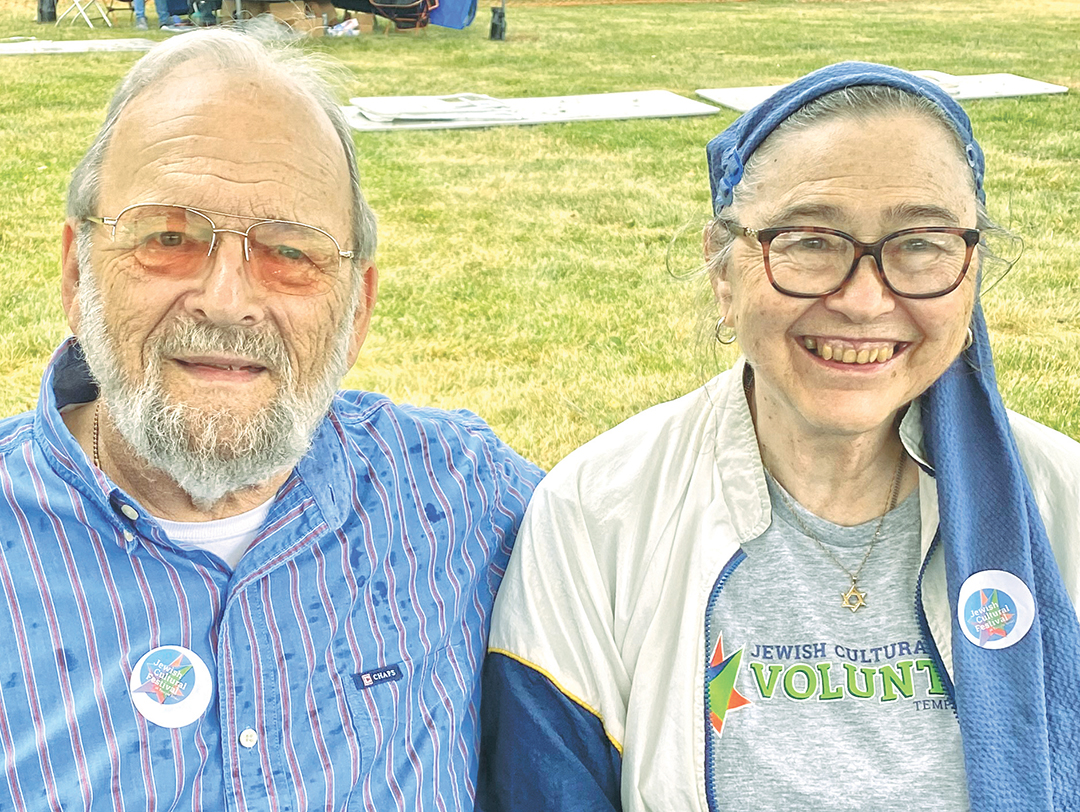
‘Almost afraid to go to a synagogue’
One couple on an extended journey that culminated with their Jewish conversions is Cory and Sharon Lemmon of Covington. Cory is 82, Sharon respectfully declines to share her age. They studied for conversion with Temple Israel’s Rabbi Tina Sobo and became Jews on May 31, 2022. They’ve been married for 15 years. Cory says their families didn’t have a lot to say about it. “We’ve been doing this for so long,” he says, about coming closer and closer to living a Jewish life.
“I went through a lot of churches myself,” says Cory, who was even a pastor for six years at Harris Creek Church of the Brethren in Bradford. He resigned after his first wife, Mary, died. He then started attending “Messianic” churches in the area in his attempt to learn more about Judaism, albeit within an evangelical Christian overlay.
Followers of “Messianic Judaism” — actually an evangelical Christian subgroup — believe that Jesus is the messiah. Some “Messianic” adherents have Jewish lineage, others are Christians who seek to connect with what they perceive as the Jewish roots of Christianity. But “Messianic Judaism” is not a Jewish movement.
At one of these congregations, Cory met Sharon. Eventually, they began to question the validity of the Christian Bible. They started exploring services and programs at various synagogues and temples across the Miami Valley, beginning with Anshe Emeth in Piqua, near where they live.
They decided to live as Noahides, non-Jews who follow the Seven Noahide Laws, which all people are obligated to observe, according to Jewish tradition. Myjewishlearning.com notes that somewhere between hundreds and thousands of former Christians have become Noahides in the modern world.
This was the journey that led them to become Jews. They felt like they knew they were Jewish. They were ready to make it formal.
“I had a really strong pull toward the Jews,” Cory says. “I want to be named among my brothers and sisters. There are so many things that we had to re-learn. But the main thing is the people. We definitely feel part of the family. I was just almost afraid to go to a synagogue. I didn’t know what was there. And that’s a shame. I just wish I had been a little bit quicker at getting it all together.”
Bashert in Israel
Ryan Lechich grew up in Connecticut in a Roman Catholic family. He wanted to join the military, so he went to Norwich University in Vermont, a small, private military college.
After a six-month hiatus at home because of the Covid pandemic, he took advantage of an opportunity to study for a year on a fellowship in Israel. At the end, he would receive a master’s degree in counterterrorism and government.
There, he also met his bashert, his intended, Israeli American Ofir Ravin, who served as a lone soldier in the Israel Defense Forces.
Ofir grew up in Maryland and had been in Israel for almost six years at that point.
They were both studying at the Interdisciplinary Center Herzliya, now Reichman University. It turned out they lived two doors down from each other.
“We traveled a lot,” Ryan says. “We went to Masada, Jerusalem.”
Ryan and Ofir were out for a run on the Herzliya beach one evening at the beginning of Israel’s 11-day conflict with Hamas in May 2021. Rockets started coming in from Gaza.
“She pushed me down. And I’m looking up and all I see are explosions. Hundreds of rockets. They were right above us. The sky was just blazing with explosions. And even though those are intercepts, the shrapnel is still coming down. We had to decide to stay in this field or just run, because it wasn’t going to stop. It was going on all night. We ran back to the dorms. People were running and it was like Armageddon.”
While they lived in Herzliya, Ofir helped Ryan find out that his maternal grandmother had fled Germany in 1938 because she had Jewish lineage.
“I didn’t know a lot about her background. We didn’t know who her dad was or anything like that,” Ryan says. “Ofir started asking questions about my family and their history. We found out that she was on a refugee ship from Germany, and that she was listed as “Hebrew” on the Ellis Island manifest. And then we found out that her dad was probably Jewish, almost certainly.”
Ryan and Ofir moved to Kettering when Ryan, on active duty with the Air Force, was assigned to a research position at Wright-Patterson Air Force Base. Last summer, he proposed. Ofir said yes.
He first began exploring conversion with Beth Abraham Synagogue’s Rabbi Aubrey Glazer a year ago, and formally began to study for conversion at the beginning of this year.
“We had a civil marriage but now we want to have a religious marriage,” Ryan says.
Ofir says the process has exposed her to a lot more Judaism, too.
“Growing up in a very secular family, and also being in the IDF for a long time, I started getting prejudiced to Judaism as a religion,” she says. “And I tried to even stay away from it. And through the rabbi and Elyssa (his wife), I’ve come to appreciate it a lot more.”
Editor’s note: Though The Dayton Jewish Observer has presented some stories about people who have become Jews over the years, I’ve shied away from these articles for two reasons. First, is the value that once someone becomes a Jew, that person is in. In Jewish tradition, we are not to “other” those who weren’t always Jewish. It’s an individual’s choice whether to talk about the journey. One’s beliefs about God are personal and private whether one is born a Jew or becomes a Jew. Some people are more comfortable than others about sharing their beliefs. The other reason is because Judaism does not proselytize. We don’t seek out non-Jews to become Jewish. We don’t aspire for everyone else to become Jewish. For those who aren’t Jewish, there are many paths to God. And not all Jews believe in God, either. One conversion student I interviewed for the story above remarked how fortunate I am to meet so many new and soon-to-be-new Jews and hear their stories. I’m very fortunate indeed. Thanks go to the area rabbis who guided me for this piece.
Correction: A previous version of this article incorrectly stated that Ryan Lechich began studying for conversion with Rabbi Aubrey Glazer at Beth Abraham Synagogue at the beginning of 2023. Lechich first began exploring conversion with Glazer last summer and formally began to study for conversion with the rabbi at the beginning of 2023.
To read the complete July 2023 Dayton Jewish Observer, click here.


